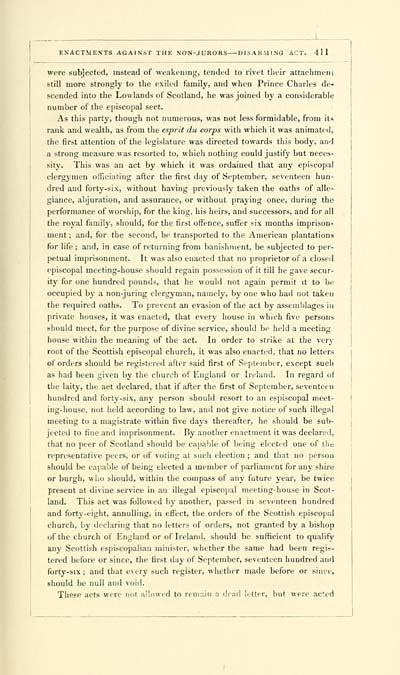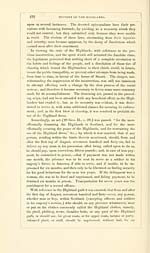Download files
Complete book:
Individual page:
Thumbnail gallery: Grid view | List view

ENACTMENTS AGAINST THE NON-JURORS DISARMINO ACT. 411
were subjected, instead of weakening, tended to rivet tlieir attaolimeni
still more strongly to the exiled family, and when Prince Charles de-
scended into the Lowlands of Scotland, he was joined by a considerable
number of the episcopal sect.
As this party, though not n\imeroiis, was not less formidable, from it-i
rank and wealth, as from the esprit dit corps with which it was animated,
the first attention of the legislature was directed towards this body, and
a strong measure was resorted to, which nothing could justify but neces-
sity. This was an act by which it was ordained that any episcopal
clergymen officiating atler the first day of September, seventeen hun-
dred and forty-six, without having previously taken the oaths of alle-
giance, abjuration, and assurance, or without praying once, during the
performance of worship, for the king, his heirs, and successors, and for all
the royal family, should, for the first offence, suffer six months imprison-
ment ; and, for the second, be transported to the American plantations
for life; and, in case of returning from banishment, be subjected to per-
petual imprisonment. It was also enacted that no proprietor of a closed
episcopal meeting-house should regain possession of it till he gave secur-
ity for one hundred pounds, that he would not again permit it to be
occupied by a non-juring clergyman, namely, by one who had not taken
the required oaths. To prevent an evasion of the act by assemblages in
private houses, it was enacted, that every house in which five persons
should meet, for the purpose of divine service, should be held a meeting
house within the meaning of the act. In order to strike at the very
root of the Scottish episcopal church, it was also enacted, that no letters
of orders should be registered after said first of September, except such
as had been given by the cliurch of England or Ireland. In regard of
the laity, the act declared, that if after the first of September, seventeen
hundred and forty-six, any person should resort to an espiscopal meet-
ing-house, not held according to law, and not give notice of such illegal
meeting to a magistrate within five days thereafter, he should be sub-
jected to fine and imprisonment. By another enactment it was declared,
that no peer of Scotland should be capable of being elected one of the
representative peers, or of voting at such election ; and that no person
should be eai'alile of being elected a member of parliament for any shire
or burgh, w lio should, w ithin the compass of any future year, be twice
present at divine service in an illegal episcopal meeting-house in Scot-
land. This act was followed by another, pa.«sed in seventeen hundred
and forty-eight, annulling, in effect, the orders of the Scottish episcopal
church, by declaring that no letters of orders, not granted by a bishop
of the church of England or of Ireland, should be sufficient to qualify
any Scottish espiscopalian minister, whether the same had been regis-
tered before or since, the first day of September, seventeen hundred and
forty-six ; and that every such register, whether made before or since,
should be null and void.
These acts were not alKiAvid to rtni.iin a di ;ul li.tter, but were acted
were subjected, instead of weakening, tended to rivet tlieir attaolimeni
still more strongly to the exiled family, and when Prince Charles de-
scended into the Lowlands of Scotland, he was joined by a considerable
number of the episcopal sect.
As this party, though not n\imeroiis, was not less formidable, from it-i
rank and wealth, as from the esprit dit corps with which it was animated,
the first attention of the legislature was directed towards this body, and
a strong measure was resorted to, which nothing could justify but neces-
sity. This was an act by which it was ordained that any episcopal
clergymen officiating atler the first day of September, seventeen hun-
dred and forty-six, without having previously taken the oaths of alle-
giance, abjuration, and assurance, or without praying once, during the
performance of worship, for the king, his heirs, and successors, and for all
the royal family, should, for the first offence, suffer six months imprison-
ment ; and, for the second, be transported to the American plantations
for life; and, in case of returning from banishment, be subjected to per-
petual imprisonment. It was also enacted that no proprietor of a closed
episcopal meeting-house should regain possession of it till he gave secur-
ity for one hundred pounds, that he would not again permit it to be
occupied by a non-juring clergyman, namely, by one who had not taken
the required oaths. To prevent an evasion of the act by assemblages in
private houses, it was enacted, that every house in which five persons
should meet, for the purpose of divine service, should be held a meeting
house within the meaning of the act. In order to strike at the very
root of the Scottish episcopal church, it was also enacted, that no letters
of orders should be registered after said first of September, except such
as had been given by the cliurch of England or Ireland. In regard of
the laity, the act declared, that if after the first of September, seventeen
hundred and forty-six, any person should resort to an espiscopal meet-
ing-house, not held according to law, and not give notice of such illegal
meeting to a magistrate within five days thereafter, he should be sub-
jected to fine and imprisonment. By another enactment it was declared,
that no peer of Scotland should be capable of being elected one of the
representative peers, or of voting at such election ; and that no person
should be eai'alile of being elected a member of parliament for any shire
or burgh, w lio should, w ithin the compass of any future year, be twice
present at divine service in an illegal episcopal meeting-house in Scot-
land. This act was followed by another, pa.«sed in seventeen hundred
and forty-eight, annulling, in effect, the orders of the Scottish episcopal
church, by declaring that no letters of orders, not granted by a bishop
of the church of England or of Ireland, should be sufficient to qualify
any Scottish espiscopalian minister, whether the same had been regis-
tered before or since, the first day of September, seventeen hundred and
forty-six ; and that every such register, whether made before or since,
should be null and void.
These acts were not alKiAvid to rtni.iin a di ;ul li.tter, but were acted
Set display mode to: Large image | Transcription
Images and transcriptions on this page, including medium image downloads, may be used under the Creative Commons Attribution 4.0 International Licence unless otherwise stated. ![]()
| Early Gaelic Book Collections > Ossian Collection > History of the Highlands and of the Highland clans > Volume 3 > (457) |
|---|
| Permanent URL | https://digital.nls.uk/79657906 |
|---|
| Description | Vol. III. |
|---|---|
| Shelfmark | Oss.249 |
| Attribution and copyright: |
|
| Description | Selected books from the Ossian Collection of 327 volumes, originally assembled by J. Norman Methven of Perth. Different editions and translations of James MacPherson's epic poem 'Ossian', some with a map of the 'Kingdom of Connor'. Also secondary material relating to Ossianic poetry and the Ossian controversy. |
|---|
| Description | Selected items from five 'Special and Named Printed Collections'. Includes books in Gaelic and other Celtic languages, works about the Gaels, their languages, literature, culture and history. |
|---|

